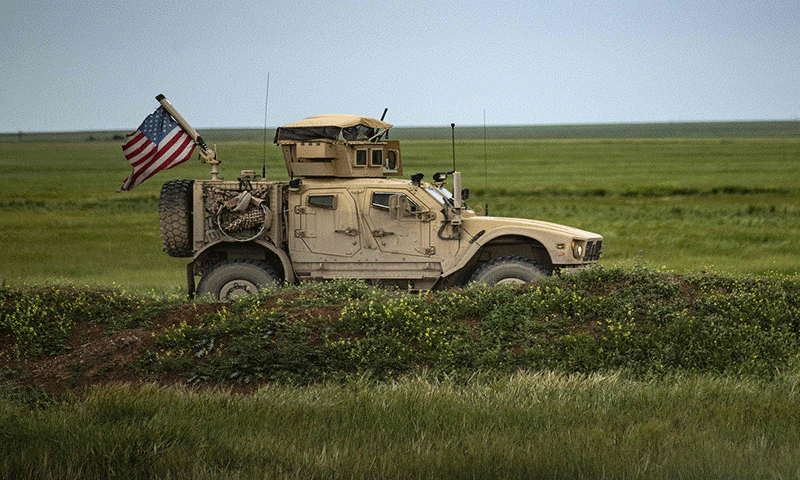Al-Hasakah – Majd al-Salem
The US-led International Coalition Forces (ICF) used 180 dunums (18 hectares) of land owned by a resident of Rmelan town in al-Hasakah governorate in northeast Syria after it paid the Syrian Democratic Forces (SDF), the de facto authority in control of the area, an amount of 400 thousand Syrian pounds (SYP = 124 USD) to use the land for military purposes.
The land’s forty-something owner told Enab Baladi, “As compensation per hectare, this amount is practically nothing. It is not in line with what the land produces.” A hectare of this fertile land, where there is good precipitation, produces about four tons of wheat worth nearly four million and 600,000 (SYP = 1,446 USD) at the price of 1,150 (SYP = 0.354 USD) per kilo, according to the sale price set by the Autonomous Administration of North and East Syria (AANES) for the current year.
Stolen compensations
The landowner who spoke to Enab Baladi on the condition of anonymity for security reasons did not rule out the possibility of the SDF stealing compensations allocated for farmers by the ICF, given that the SDF does not allow farmers to appoint a representative of them to meet with any of the ICF’s officials.
The SDF makes sure that compensations are determined and received through the Agricultural Society Development Company in Rmelan, which works under its supervision.
According to the landowner, the SDF did not only pay “little compensations” to farmers, but it also manipulated the measurements of the areas used by the ICF, alleging that it used small plots to pay us less.
Several owners of agricultural lands in Rmelan demanded the SDF to pay them fair compensations commensurate with the damages caused by the US forces who used their lands as a military base.
A lawyer for one of the affected landowners told Enab Baladi after requesting his last name to be withheld for security reasons that since the beginning of this year, US forces have expanded their military base to the southeast of Rmelan by about 12 kilometers and that the base was originally an agricultural airfield.
The US forces took over most of the arable lands near the base and turned them into campus to the military base and airport inside. They prevented owners from cultivating their lands which became “an exclusive military zone,” the lawyer said.
The SDF informed landowners they would receive an annual compensation of 400,000 (SYP = 124 USD) per hectare for the current year, which the landowners rejected, according to the lawyer.
Land produce outweighs granted compensations
One of the owners said he was compensated for only ten hectares out of 23 taken by the US forces and annexed to the campus of the military base in Rmelan. He mentioned that he received an amount of only 200,000 (SYP = 16 USD) for each hectare.
As reported to Enab Baladi by locals from Rmelan, the lands used by the ICF belong to the households of al-Jaffal, al-Farhan, and al-Amyan, with a total area of about 130 hectares.
On 4 June, the official military spokesperson for the Combined Joint Task Force-Operation Inherent Resolve (CJTFOIR), Colonel Wayne Marotto, published on his Twitter account, “The CJTFOIR military mission is designated to support the SDF and local security forces to defeat the Islamic State (IS). There has been no increase in the number of US/ICF troops in northeast Syria or the number of bases.”
According to Jusoor for Studies Center, the ICF has 19 military posts in al-Hasakah governorate distributed in different areas near the oil fields of al-Shaddadi, Rmelan, al-Malikiyah, al-Yaarubiyah, al-Hasakah city, the western countryside of Qamishli, and Tal Tamer.











